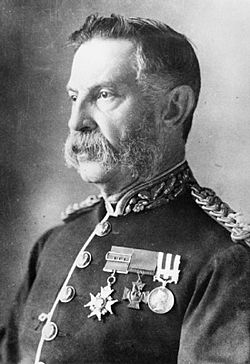James Blair (Indian Army officer) facts for kids
Quick facts for kids
James Blair
|
|
|---|---|
 |
|
| Born | 27 January 1828 Neemuch, British India |
| Died | 18 January 1905 (aged 76)) Melrose, Scottish Borders |
| Buried |
Trinity Churchyard, Melrose
|
| Allegiance | |
| Service/ |
|
| Rank | General |
| Battles/wars | Indian Mutiny |
| Awards | |
| Relations | Robert Blair VC (cousin) |
| Other work | British Resident in Aden |
General James Blair (born January 27, 1828 – died January 18, 1905) was a very brave Scottish soldier. He received the Victoria Cross (VC), which is the highest award for bravery in the face of the enemy. This special medal is given to members of the British and Commonwealth armed forces.
Contents
Early Life and Military Start
James Blair was born in Neemuch, a place in India that was then part of the British Raj. His father was also a military captain. In 1844, when James was 16, he joined the 2nd Bombay Light Cavalry. This was part of the Bombay Army in India. By 1848, he had become a Lieutenant.
Earning the Victoria Cross
James Blair was a Captain when he earned his Victoria Cross. He was 29 years old during the Indian Mutiny of 1857. He showed incredible courage on two separate occasions.
First Act of Bravery: Neemuch
On the night of August 12, 1857, at a place called Neemuch, Captain Blair volunteered for a dangerous mission. He went to capture a group of armed rebels who were hiding in a house. He bravely broke down the door and rushed inside. The rebels were forced to escape through the roof. Even though he was badly wounded during this fight, he chased after them. It was too dark to catch them, but his bravery was clear.
Second Act of Bravery: Jeerum
On October 23, 1857, at Jeerum, Captain Blair again showed amazing courage. He was completely surrounded by rebels. He fought his way through them, breaking his sword on one of their heads. He also received a severe cut on his right arm. Despite his injuries and having only the hilt of his broken sword, he rejoined his troop. He then led his men in a powerful charge that scattered the rebels.
Later Career and Retirement
Captain Blair continued to serve in the Indian Army after the Indian Mutiny ended. He took part in the pursuit of Tatya Tope, a leader of the rebellion.
Later, he became a Political Resident in Aden from 1882 to 1885. During this time, he held the rank of brigadier-general. He was promoted to major-general in 1885. In 1889, he became a lieutenant-general and was given another important award, the Order of the Bath. He retired from active service in 1890. In 1894, he was promoted to the rank of General. In 1904, he became the colonel of the 32nd Lancers.
Final Years
General James Blair passed away at his home in Melrose, Scotland, in January 1905. He was 76 years old. He was buried at Trinity Churchyard in Melrose.
Interestingly, James Blair's cousin, Captain Robert Blair, also won the Victoria Cross during the same Indian Mutiny.
 | Roy Wilkins |
 | John Lewis |
 | Linda Carol Brown |

